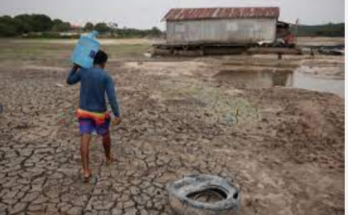A social media influencer who was trying to lose more than half her body weight as an inspiration to her followers has reportedly died while attending an intensive weight-loss boot camp in northwestern China, fueling a debate over how to regulate the influencer industry.
The death of the 21-year-old influencer, who posted under the name Cuihua, has prompted state media to warn over the safety risks involved in weight-loss camps and renewed concerns over the pressures women are under to conform to mainstream beauty standards.
It has also intensified scrutiny of the influencer industry, coming just weeks after a young man in the country died after live-streaming himself drinking several bottles of strong alcohol.
⇒Join us on Telegram for more Sure and Accurate football-winning tips every day...click here
Cuihua had been documenting her weight-loss journey to her tens of thousands of followers on Douyin, China’s version of TikTok, in a bid to encourage them in their own fights against obesity, state media outlets in the country reported.
She had recently posted several videos of herself undergoing intensive training exercises and shared that she weighed 156 kilograms (344 pounds) and was trying to lose 100 kilograms.
Videos posted on the young influencer’s account showing her running and weight-lifting were shared heavily on Chinese social media and also appeared in various state media outlets following her death late last month.
China National Radio reported that Cuihua – identified by her family name of Zhou – had joined several weight-loss camps in various cities in a bid to reach her goal and had lost more than 27 kilograms (60 pounds) in the two months leading up to her death.
CNR said Cuihua had attended her final camp in Shaanxi province just two days before her death.
While that camp promoted “nutritious meals, rest and healthy exercise,” they said she had chosen to limit her diet while also undergoing intense exercise.
Videos of Cuihua training have since been removed from the account and pictures deleted.
State media outlets said that the influencer’s family had received “compensation” from the weight loss camp in Shaanxi, but did not say how much.
Local authorities have said they are investigating the death and whether the weight loss camp was conducting excessive or improper training. CNN has reached out to the Huayin government in Shaanxi province for a comment.
Rising concerns
Zhou’s death has brought renewed scrutiny on both the weight-loss and influencer industries.
In China, as in much of Asia and the rest of the world, social media is awash with unhealthy and unrealistic trends promoting extreme weight loss.
Experts in eating disorders and sports nutrition warn that even seemingly healthy behaviors such as increasing levels of exercise and dieting can be harmful when motivated by a negative body image and taken to extremes. In extreme cases, the resulting problems can go beyond mental health and lead to severe medical complications affecting the heart, brain, liver, kidneys and other organs.
One notorious recent social media trend in China involved women posing behind vertical sheets of printer paper to prove their waists were so thin they could not be seen either side. Other fads have seen influencers uploading selfies to show how many coins they can hold in their collarbones to show how thin they are, or trying on children’s clothes to highlight their petite physiques.
At the same time, rising levels of obesity in the country have put further pressure on many women.
Recent national survey data suggests more than half of Chinese adults are now either overweight or obese, according to the Lancet, and obesity rates are expected to increase.
Meanwhile, there are also concerns that some weight-loss camps are marketing increasingly extreme regimens as unrealistic quick fixes.
“Weight loss boot camps are growing savagely, with a lot of false health and advertising complaints. It is common for trainees to get injured during the unregulated training process,” the state-owned news agency China News Service cautioned.
Zhou’s death has also increased scrutiny of the social media influencer industry more generally. The industry has attracted criticism from authorities in recent years due to the lavish lifestyles that some influencers showcase and the increasingly extreme challenges they take part in to appeal to their audiences.
That debate was reignited last month when an influencer known as “Brother Three Thousand” was found dead just hours after broadcasting himself drinking several bottles of Baijiu, a Chinese spirit with a typical alcohol content of between 30% to 60%, as part of an online competition.
Last year, the country’s broadcasting authorities banned youngsters under the age of 16 from tipping livestreamers and restricted their access after 10 p.m.
China’s National Video and Television Administration and the Ministry of Culture and Tourism have also moved to ban “31 misbehaviors by livestreamers.”
Among those misbehaviors are “encouraging users to interact in vulgar ways,” according to the state media outlet Global Times.
Commenting on the latest death, and the strain weight-loss challenges put on the body, one popular comment on the Twitter-like platform Weibo said Zhou’s was “another innocent life scourged by marketing and influencer culture.”






